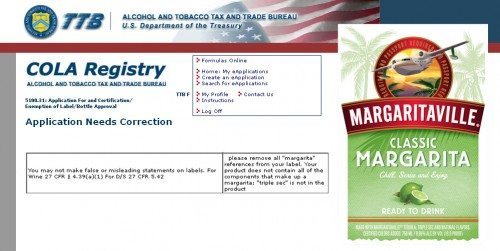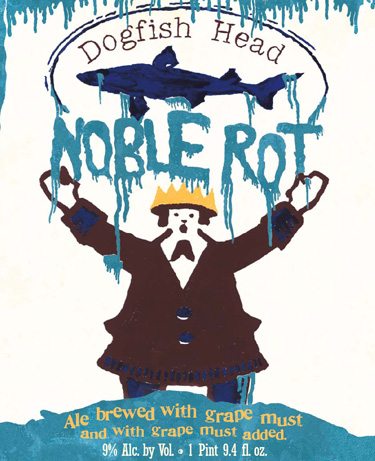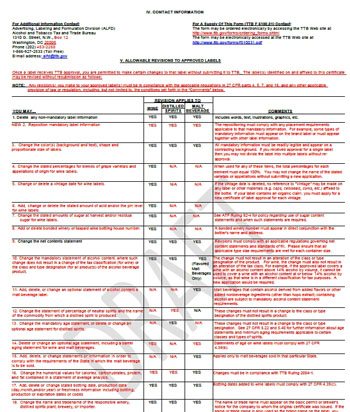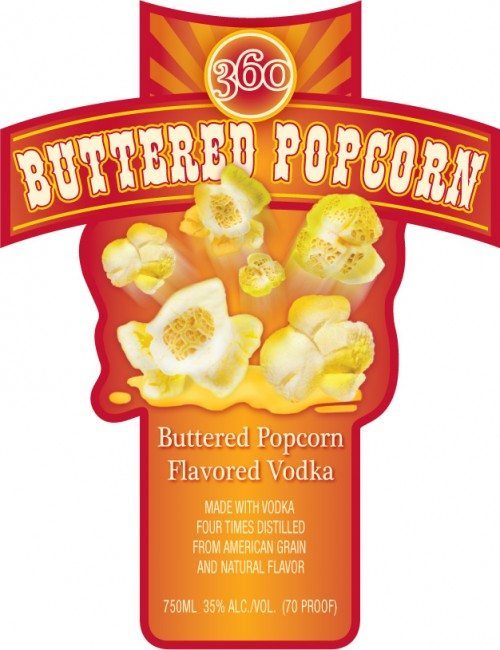Buttered Popcorn. Flavored Vodka. In the same bottle. Speechless.
Continue Reading Leave a CommentGluten Free Ruling

TTB announced a big policy change — about gluten free — just before the Memorial Day holiday weekend. For many years before the announcement, plenty of companies have tried to make “gluten free” claims, but we still didn’t see any approved TTB labels referring to “gluten free.” A few weeks back, we thought we had one, when we heard a lot of buzz about Omission beer as above. But alas, even the Omission label has had a big omission when it comes to this particular claim. All this is about to change in a big way, as result of this TTB Ruling, released late last week. As a result, we may begin to see various gluten free claims on TTB labels in the very near future. To show the earlier TTB policy, a fairly recent TTB rejection is here, and it may help explain why Widmer did not come out and say it louder or earlier. TTB’s caution may well have been justified; Brewbound has explained: “The release of Omission Beer comes just a few months after a study published in the Journal of Proteome Research found that eight commercial beers currently labeled as ‘gluten-free’ contained as much gluten as regular beer.” Brewbound further explained that there are plenty of other beers that seek...
Continue Reading Leave a CommentTags: policy, rejections, therapeutic
The Triple Sec Lobby

The highly secretive and powerful Triple Sec lobby has struck again — this time to require at least one drop of triple sec in certain alcohol beverages. Google it as much as you wish, and you will find little about this uber-secret institution, rumored to have strong ties leading all the way back to France. That’s because it’s secret. Some even say that Sen. John Kerry, with his thinly disguised sympathies for many things French, is Triple Sec’s man in Washington. On a more serious note, for many years, TTB has required at least some triple sec in products that purport to be margaritas. The policy is here, at page 13 (scroll down to Margarita). The policy is in TTB’s “Beverage Alcohol Manual” for spirits. The BAM can be a handy resource to explain and supplement the regulations. Sometimes, as here, it goes considerably beyond what the law or regulations say. In this particular case, it seeks to mandate that every margarita must have: “Tequila, triple sec and lime or lemon juice or oil or natural lime or lemon flavor.” Here is a recent example of TTB seeking to enforce the rule. Does such a rule make any sense in this day and age of scarce resources? What is the worst that...
Continue Reading Leave a CommentTags: policy, rejections
Dogs + Fishes, Beer + Wine

Shanken News Daily recently alerted us to Dogfish Noble Rot. It is:
a wine/beer hybrid that combines traditional barley, hops, water and yeast with winegrapes. Named for the grape fungus botrytis, which is associated with Sauternes and Tokaji dessert wines, Noble Rot uses Viognier and Pinot Gris grapes sourced from Washington’s Alexandria Nicole Cellars. The 9%-abv offering will be available in about 27 states this week, priced at $13 a 750-ml.
The statement of composition on this product looks a bit redundant, with two references to grape must — but upon closer review it nicely underscores the distinction about adding the grape must before and after fermentation. I wonder if the must added before fermentation could or should be considered wine. Dogfish explains:
Continue Reading Leave a CommentThe first addition is unfermented juice, known as must, from viognier grapes that have been infected with a benevolent fungus called botrytis. This noble rot reduces the water content in the grapes while magnifying their sweetness and complexity. The second is pinot gris must intensified by a process called dropping fruit, where large clusters of grapes are clipped to amplify the quality of those left behind. “This is the absolute closest to equal meshing of the wine world and the...
Label Flexibility

TTB has been working on a new COLA form, with new and more flexible rules about what may change without seeking a new label approval. TTB announced this in the January 13, 2012 Newsletter and the Federal Register two weeks prior.
The new rules, if/when implemented, could allow a huge variety of big and small changes — without the need to submit, wait, haggle.
Here is the draft form. For example, the new rules (at page 3) would allow you to:
- Move mandatory around. This is at category 2. This would allow you to move VODKA from the bottom of the front label to the top of the front label, for example. It would not allow you to move VODKA from the front to the back. (The draft form does not seem to make it clear, about whether it’s also okay to reposition non-mandatory. It would be very strange if okay to move the important stuff but not the less important stuff.)
- Change colors. This is at category 3.
- Add/delete/change a QR code. This is at category 22.
- Add/delete/change social media icons. This is at category 25.
- Add/delete/change information about awards. This is at category 26. It remains a bad idea to announce “Award for most antioxidants in a Cabernet.” ...


